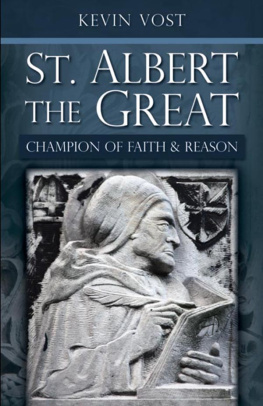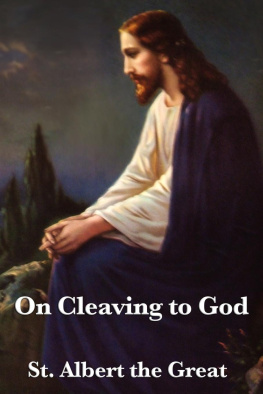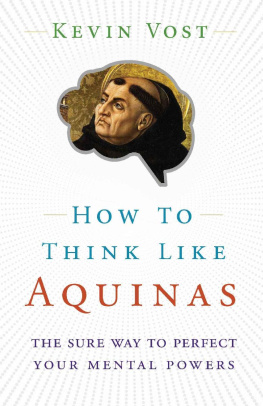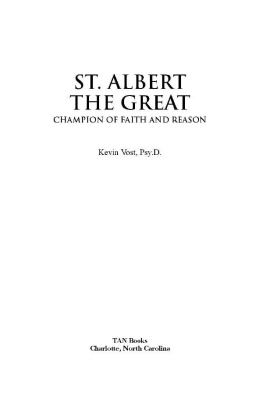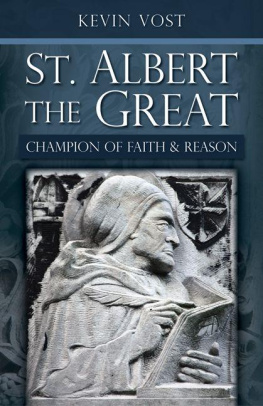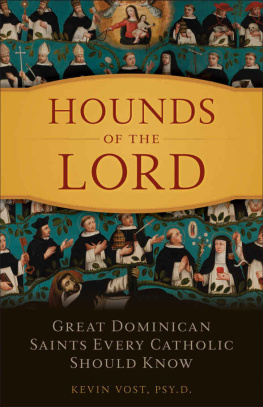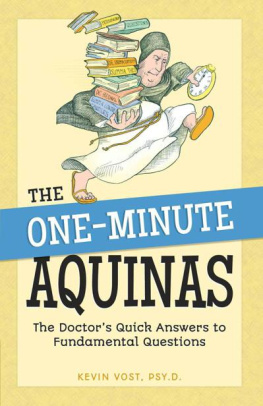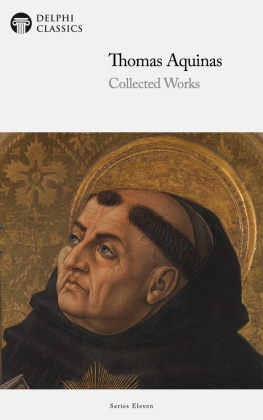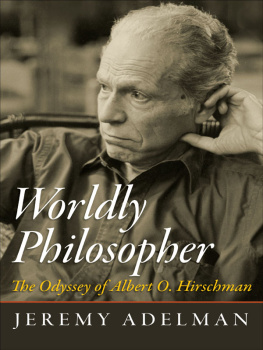St. Albert the Great
Champion of Faith and Reason
Kevin Vost, Psy.D.
TAN Books
Charlotte, North Carolina
2011 Kevin Vost
All rights reserved. With the exception of short excerpts used in articles and critical reviews, no part of this work may be reproduced, transmitted, or stored in any form whatsoever, printed or electronic, without the prior written permission of the publisher.
ISBN: 978-0-89555-908-1
ISBN: 978-1-935302-77-3
ISBN: 978-1-935302-76-6
Cover design by Milo Persic.
Cover image: Albertus Magnus Brother Lawrence Lew, O.P.
To Sister Mary Lawrence Green, O.P. and the Dominican Sisters of Springfield, Illinois
Part I Thinker
Part II Doer
Part III Lover
Great men are not great for themselves alone; they bear us up; our confidence is implicitly grounded in their existence. With their help, we can make for ourselves a life as great as theirs, except for the disproportion between our powers and theirs.
A. D. Sertillanges, O.P.
My first and foremost thanks go out to Todd Aglialoro, my four-time editor, and therefore a paragon of the virtues of patience and perseverance, four times over. Many thanks as well to all at TAN Books who agreed it was time again to tell the story of Albert the Great, such a great-souled though unsung saint.
Also duly acknowledged are those dynamic people in the world of Catholic media who afford me the joy of sharing the messages within my books. These include, to name but a few, John Barger at Sophia Institute Press; Bert Ghezzi of Our Sunday Visitor; Matt Swaim and Brian Patrick of EWTN/Sacred Heart Radios Son Rise Morning Show; Dave Zelzer and Wendy Wiese at Relevant Radio; Leslie Teeling and Jon Leonetti at KWKY Catholic Radio Des Moines; Al Kresta and Nick Thomm of Kresta in the Afternoon; and Darin DeLozier and Patrick Coffin at Catholic Answers Live. Many thanks also to Johnnette and Thea Benkovic, two Women of Grace at EWTN, and also to Doug Keck and Lee South, who have featured my previous books on the EWTN Bookmark show.
Among the many great-souled individuals Ive had the pleasure to collaborate with recently in various projects and endeavors, special thanks to authors Shane Kapler, Peggy Bowes, and Cheryl Dickow; blogger/reviewer Steven McEvoy; Katy Walker of iibloom.com, and to psychotherapist Karen Rumore. Thanks so much for recommending my books of old (though theyre not that old).
Finally, thanks as always to Kathy Vost, who so deftly runs a family and a household, while I plod along at a book-laden desk and a keyboard.
Authors Preface
Magnanimity by its very name denotes stretching forth the mind to great thingsAnd since a virtuous habit is denominated chiefly from its act, a man is said to be magnanimous chiefly because he is minded to do some great act.
St. Thomas Aquinas
They [scientists] need courage and initiative in their efforts to fathom the secrets which nature holds, and to adapt their discoveries to the needs of man: that requires magnanimity, which was Alberts most characteristic quality.
Sr. M. Albert, O.P.
Too few today are truly great. Weve become a culture of narrow chests, sloped shoulders, and shrunken heads. And my, what tiny noggins! It seems we just arent putting enough substantial stuff inside our brains to keep them from shriveling back inside their vacant vaults. No wonder so few of us wear hats today, what with so little cranium to hold them up. We are awash in information, plugged in constantly to electronic media, yet our attention is scattered. Nothing sinks in. What flies in the one ear, flies right out the other, leaving a passage for the next fleeting little sound bite of useless trivia.
There is much truth to a commonplace saying of our day: Use it or lose it! Were just not using our minds enough to stop the shrinkage, and weve allowed ourselves to become small, small as individuals and small as a culture. Weve become a culture of death because we think too small to embrace the bigness and greatness that is life.
So what do we need to become great, to achieve that quality of magnanimity or greatness of soul of which St. Thomas Aquinas speaks?
We need a hero.
We need the witness of people who have become, by the grace of God, great. People who have taken their God-given talents and gifts and run with them. People whose lives, as St. Thomas put it, savor of excellence.
St. Thomas certainly knew firsthand about greatness of soul. His mind was always stretched toward the greatest of all thingsGod and also to His creation as it reflected Him. He also studied intently and wrote copiously on this concept of magnanimity, basing his work largely on the efforts of Aristotle, who had stretched his mind like no other before and very few since. And he also had the acquaintance of one of those very few men who were actually called great while they still lived on Earth. That man was St. Thomass teacher, and later, the champion of his thought. He is the subject of this book: St. Albert the Great.
St. Albert stretched his entire being toward many great things. He was broad of shoulders, noble in body and mind, with a wonderful memory for fact. His life savored of excellence in so many different areas. With the eye of the scientist, he plumbed the secrets of nature; with the heart of a saint, he never forgot that nature was Creation. He was grateful to God and to all the living and the dead who had taught him and helped him. He was beneficent and generous like few others, sharing his plenitude of gifts not only with the men and women of his time, but with those of our time and all times.
Please join me, then, as I lay out a plan for stretching our minds toward the life and lessons of this great-souled man, the professor of the University of Paris, the German provincial of the Order of Preachers, the bishop of Ratisbon, the patron of the sciences, the Universal Doctor of the Catholic Church: St. Albert the Great.
Introduction
They had discussed with one another who was the greatest. And he sat down and called the twelve: and he said to them, If any among you would be first, he must be least of all and servant of all.
Mark 9:34-35
St. Albert can fittingly be called the miracle and wonder of our time.
Ulric of Strasbourg
Though he wasnt canonized until 1931, St. Albert of Cologne has been known as the great since his own daythe 13th centurydue to his incredible breadth of knowledge. It was said that Albert quite simply knew everything there was to know! Throughout these pages, then, well look at how he put his powerful mind to plumbing the mysteries of creation through virtually every science and intellectual discipline known to manliterally from a to z, with contributions to fields as diverse as anatomy, anthropology, astronomy, biology, botany, chemistry, dentistry, geography, geology, medicine, physiology, physics, psychology, and zoology.
Albert was a master philosopher as well, intimately conversant with the systems of the most profound thinkers of the ancient Greek and Roman worlds. In his mastery of scripture and theology, also, he knew few peers in his time. And Albert did not keep his knowledge to himself. He was a great professor, teaching philosophy and the sciences to grateful students throughout Europe. For these reasons, and good reasons they are, Albert was called great in his own time.
Perhaps you are wondering, though, If Albert was so great, then why dont we know more about him? Good question! And the answer, I think, is found in those words of Jesus that began this introduction. It is one thing to be great in the eyes of the world, still another to be great in the eyes of Christ. Albert had both kinds of greatness, and it was because of that second, Christlike kind of greatness that he did not seek to draw attention to himself. He did such a good job making himself the least and servant of us all that the world has, in some measure, forgotten his true stature.
Next page
